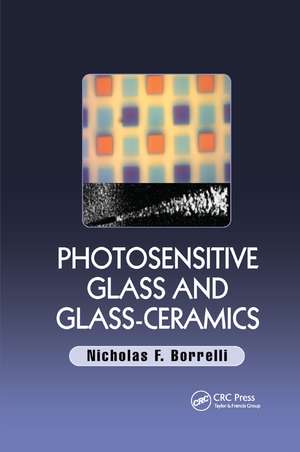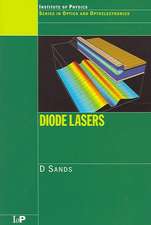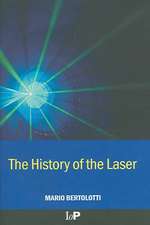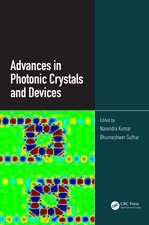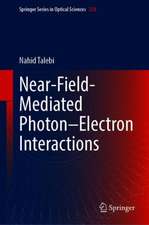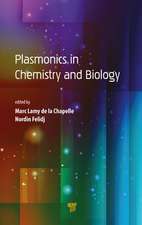Photosensitive Glass and Glass-Ceramics
Autor Nicholas F. Borrellien Limba Engleză Paperback – 12 dec 2019
| Toate formatele și edițiile | Preț | Express |
|---|---|---|
| Paperback (1) | 497.69 lei 6-8 săpt. | |
| CRC Press – 12 dec 2019 | 497.69 lei 6-8 săpt. | |
| Hardback (1) | 1240.24 lei 6-8 săpt. | |
| CRC Press – 12 iul 2016 | 1240.24 lei 6-8 săpt. |
Preț: 497.69 lei
Preț vechi: 666.07 lei
-25% Nou
Puncte Express: 747
Preț estimativ în valută:
95.24€ • 101.84$ • 79.40£
95.24€ • 101.84$ • 79.40£
Carte tipărită la comandă
Livrare economică 17 aprilie-01 mai
Preluare comenzi: 021 569.72.76
Specificații
ISBN-13: 9780367875121
ISBN-10: 0367875128
Pagini: 248
Dimensiuni: 156 x 234 mm
Greutate: 0.49 kg
Ediția:1
Editura: CRC Press
Colecția CRC Press
ISBN-10: 0367875128
Pagini: 248
Dimensiuni: 156 x 234 mm
Greutate: 0.49 kg
Ediția:1
Editura: CRC Press
Colecția CRC Press
Cuprins
1) Introduction. Bit of history. Technical Relevance. Scope. 2) Basic photosensitive mechanism. 2.1) Initial chemistry. 2.2) Metal ions. 2.3) Origin of color. 3) Other phases produced photosensitively. 3.1) Basic mechanism for photo- nucleation of other glass-ceramic phases 3.11) Li-metasilicate (Fotoform™) 3.111) Photo-machinable 3.112) Spherical lens arrays (SMILE™). 3.12) NaF (Fota-Lite™) 3.121 Colored 3.13) NaF (Polychromatic™) 3.131) mechanism of controlled color 3.14) AgCl (Rainbow) 3.141) Mechanism of thermal formation 3.142) photo-induced effects) 3.15) Li-aluminosilicate (Nepheline) 3.151) example of double nucleation phenomenon 4) Photorefractive Effects (induced refractive index) 4.1) NaF-based 4.11) Holograms 4.12) Gradient index lenses 4.2) Photorefractive and polarizing 4.21 Photorefraction (see 3.142) 4.22) polarizing mechanism 4.3) Fs-laser induced 4.31) waveguides 4.32) gratings 4.4) Bulk Fiber Bragg Grating SiO2/GeO2+ H2 5) Photo-adaption 5.1) definition and description of the various manifestations 5.11) photo-induced color 5.12 photo-induced polarization 6) Solarization 6.1) Different Mechanisms 6.2) Extent of effect in different glasses 6.3) Bleaching effects 7) Photochemistry in porous Vycor™ 7.1) description and preparation of porous glass 7.2) photo-produced effect with the aid of organo-metallic impregnation
Notă biografică
Nicholas F. Borrelli presently is in a position as a corporate research fellow in the research division of Corning Incorporated located in Corning NY.
Recenzii
"Photosensitive Glass and Glass-Ceramics is a great balance of the underlying physics, chemistry, optics, and glass structure, thoroughly described in an easy-to-read style by an unquestioned authority on the topic. It is a must-read for any one working in photosensitive glass and glass-ceramics."—John Ballato, Clemson University, South Carolina, USA
"A remarkable book written by an authoritative, highly accomplished, and internationally renowned glass scientist. Comprehensive, informative, and exceptionally well written, it is a must read for all involved in photosensitive glass and glass-ceramic materials." —L. David Pye, New York State College of Ceramics at Alfred University, USA
"…clear and straightforward at several levels; it fills a void for teaching at the undergraduate and graduate level. An important contribution to the history of materials science." —Carlo Pantano, The Pennsylvania State University, USA
"Written with passion, this book is a masterpiece of science and technology domain." —Eugen Pavel, Storex Technologies, Wilmington, Delaware, USA
"A remarkable book written by an authoritative, highly accomplished, and internationally renowned glass scientist. Comprehensive, informative, and exceptionally well written, it is a must read for all involved in photosensitive glass and glass-ceramic materials." —L. David Pye, New York State College of Ceramics at Alfred University, USA
"…clear and straightforward at several levels; it fills a void for teaching at the undergraduate and graduate level. An important contribution to the history of materials science." —Carlo Pantano, The Pennsylvania State University, USA
"Written with passion, this book is a masterpiece of science and technology domain." —Eugen Pavel, Storex Technologies, Wilmington, Delaware, USA
Descriere
This book will discuss how glass and glass ceramic interact with light, both transiently and permanently. Ways that light permanently alter the properties of glass and glass ceramic like the color, refractive index, and mechanical and chemical behaviors will be included. Each photochromatic phenomenon will be discussed in detail from the physica
